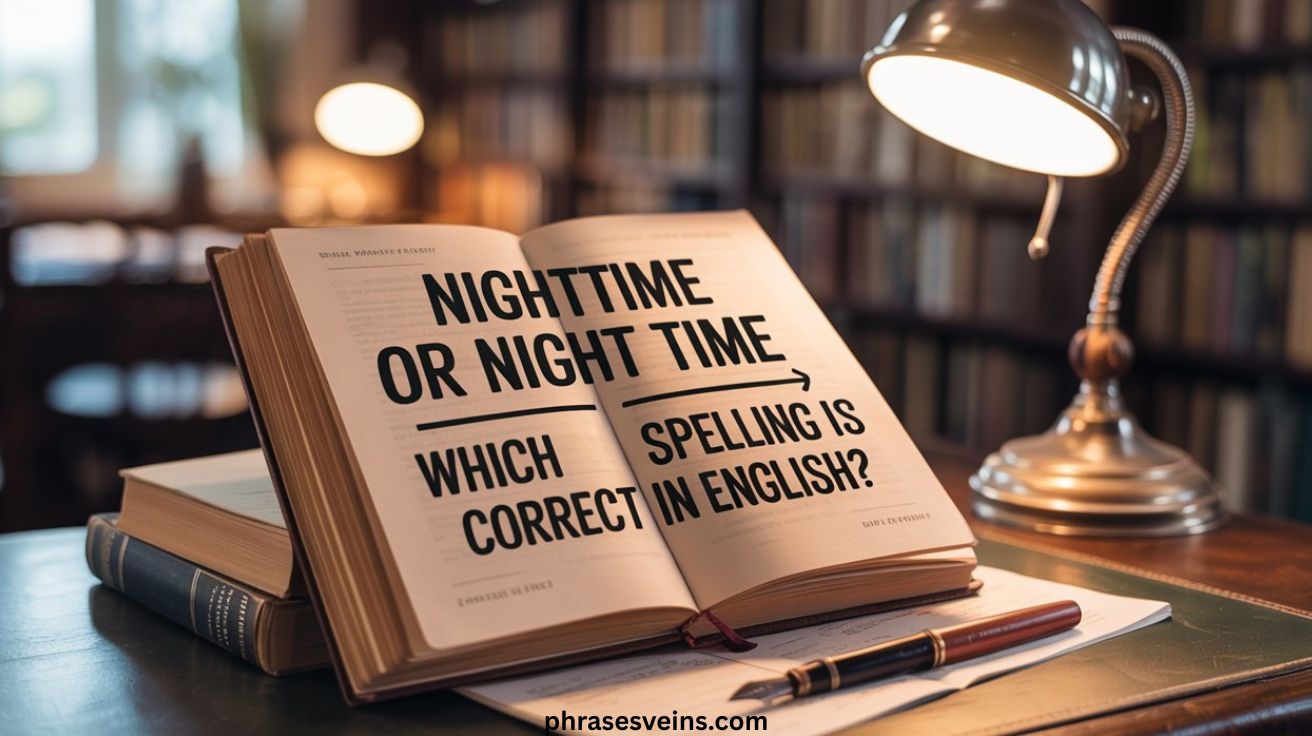Is it nighttime or night time? This question trips up writers, students, and even professionals. Both versions appear in print, yet only one holds the crown as the standard spelling. The confusion comes from the way compound words evolve in the English language. Some merge into one, others remain separate, and a few even live double lives depending on context.
In this article, we’ll settle the debate once and for all. You’ll see how the word developed historically, what grammar experts and dictionaries say, and when each version appears in everyday usage. By the end, you’ll know the correct spelling for any context—whether you’re writing a school essay, drafting a formal proposal, or just polishing your English usage skills.
Nighttime vs Night Time – The Key Difference
When comparing nighttime vs night time, the difference lies in spelling accuracy and language rules. Nighttime (one word) is the dictionary accepted form, officially listed as a noun meaning “the period of night.” It’s the recognized spelling in modern dictionaries and recommended for academic writing and professional writing.
Night time (two words) is considered an older variation. It still pops up in colloquial usage and some informal contexts, but grammar guides label it less precise. If you want spelling accuracy and to follow normative spelling practices, “nighttime” is your safest choice.
Historical Roots of the Word
The journey from “night time” to nighttime reflects how English compounds evolve. Early etymology shows “night time” being used as two separate words in Old and Middle English. Over centuries, common phrases often fuse together for simplicity.
This historical derivation mirrors other words like “anytime” (formerly “any time”) or “daytime” (once “day time”). The historical background proves how usage shapes spelling, giving us the conventional spelling “nighttime” we rely on today.
What Do Dictionaries and Experts Say?
If you check the dictionary spelling, “nighttime” wins. Major sources like Merriam-Webster, Oxford, and Cambridge list nighttime as the standard spelling and official spelling.
Linguistic experts highlight that “night time” survives only in informal contexts or poetic style. For proper usage, particularly in academic writing, scholarly writing, or a business proposal, “nighttime” is the correct choice.
Usage in Modern English
Today, you’ll see nighttime far more often in everyday usage. It appears in newspapers, novels, and even marketing campaigns. It’s the natural choice for appropriate use in formal writing.
“Night time,” however, sometimes appears in casual blogs, conversational text, or creative writing. This makes it part of colloquial usage, but not suitable usage for serious documents.
Grammar and Function of Nighttime
Nighttime works as a noun. You can say: “Nighttime is peaceful.” It represents a block of hours during the night, similar to “daytime.”
It also functions in proper writing as a subject or object. Example: “She enjoys reading at nighttime.” This demonstrates correct application and accurate use within grammar rules.
Nighttime as a Modifier (Adjectival Noun)
Sometimes, nighttime takes on the role of a modifier, almost like an adjective. Writers use it in business naming and marketing and branding. Example: “nighttime routine,” “nighttime view.”
Here, the word describes something connected to the night, keeping its noun form but modifying another idea. It’s common in everyday usage and business development contexts.
Night Time as Two Words – When It Appears
Although outdated, night time hasn’t disappeared. It still appears in informal writing, colloquial usage, or literary texts aiming for a certain rhythm.
For instance, in poetry or storytelling, a writer might prefer “night time” for style. But in official writing or academic usage, it’s not considered accurate spelling.
Real-World Examples of Nighttime vs Night Time
You’ll encounter nighttime in health, wellness, and lifestyle industries. Brands market products like “nighttime tea” or “nighttime cold medicine” because the spelling looks polished and professional.
“Night time,” meanwhile, shows up in personal blogs, song lyrics, or informal notes. It reflects informal contexts rather than professional writing or proper spelling.
Related Confusions with Compound Words
The nighttime vs night time confusion isn’t unique. English has several cases where two words merged over time. Examples include “sometime” vs “some time,” “anytime” vs “any time,” and “daytime” vs “day time.”
These spelling variations remind us that the English language evolves. Keeping track of dictionary accepted forms ensures your spelling accuracy stays sharp.
Practical Writing Advice
If you’re ever unsure, choose nighttime. It’s the correct spelling, the one listed in dictionaries, and universally accepted in grammar. Think of it as the “bright” choice in the brite vs bright debate—it’s polished, accurate, and professional.
Reserve night time only for stylistic or informal use. If you’re writing a formal proposal, company proposal, or any scholarly writing, stick with nighttime for proper usage.
Frequently Asked Questions
Is it nighttime or night time in the Oxford Dictionary?
According to the Oxford English Dictionary, the correct and most common spelling is “nighttime” as one word. It’s listed as the standard form, while “night time” (two words) is less common and considered a variant.
What is the difference between night and nighttime?
The word “night” refers to the period of darkness between sunset and sunrise, often used in contrast with “day.” “Nighttime”, on the other hand, functions as a noun that specifically refers to the duration of the night, emphasizing the period itself rather than just the concept.
Example:
- I prefer working at night. (general time)
- Nighttime is peaceful in the countryside. (specific duration)
How do you use nighttime in a sentence?
Here are a few examples of correct usage:
- Nighttime is the best time for stargazing.
- The city lights glow beautifully during nighttime.
- Children often need reassurance at nighttime.
How do you write night time?
Both “nighttime” and “night time” are understood, but “nighttime” (one word) is the dictionary-accepted and standard spelling. If you want to follow formal or academic writing rules, always choose “nighttime.”
Conclusion
So, should you write nighttime or night time? The answer is simple: nighttime is the standard spelling, with centuries of etymology backing it and the approval of every major dictionary. It’s the right fit for academic writing, business plans, and all forms of proper writing.
Night time lingers in colloquial usage and creative works, but it lacks spelling accuracy in serious contexts. For clear, professional, and credible English usage, always rely on “nighttime.”

Welcome to PhrasesVeins, where Arabella Reed brings language to life. With a passion for grammar and phrases, Arabella offers unique insights to help you master language and enhance your expression. Whether you’re a language enthusiast or looking to improve your skills, Arabella’s work guides you through the beauty of words.

